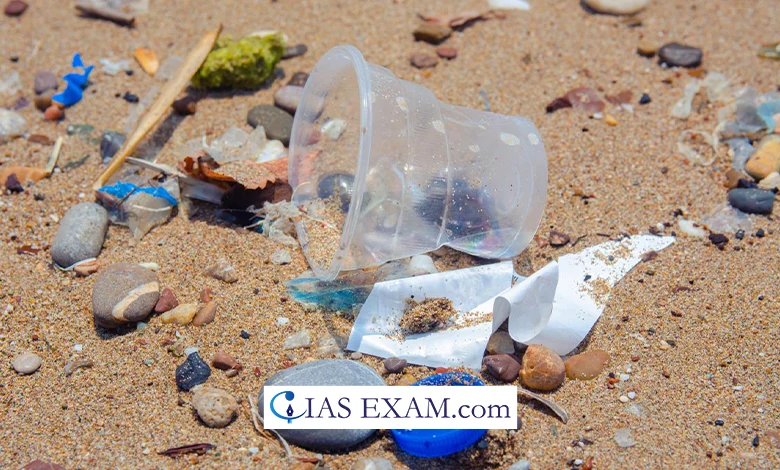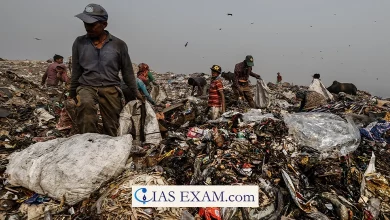Daily Current Affairs for UPSC
Need for a Global Plastics Treaty
Syllabus - Environment [GS Paper-3]

Context
Negotiators and observers from 175 countries have recently arrived in Ottawa, Canada, in order to begin talks regarding the very first global treaty to curb plastics pollution.
Key Highlights
- Under the UN Environment Assembly Resolution 5/14, the Intergovernmental Negotiating Committee (INC) is responsible for handing over a global plastics treaty by the end of 2024.
- The INC started its work all by the second half of 2022. It is the fourth round of negotiations and the very last round will take place in South Korea.
Concerns of Plastic Pollution
- Plastics are hard to get rid of because of their sluggish decomposition rate in herbal ecosystems.
- Plastics spoil down into their smaller devices known as microplastics, which discover their way throughout the planet, from the depths of the Pacific Ocean to the heights of the Himalayas.
- BPA or Bisphenol A, the chemical which is used to harden the plastic contaminates foods and drinks, causing alterations in liver feature, fetal development in pregnant ladies, the reproductive system and brain function.
- Plastic, that’s a petroleum product, also contributes to international warming. If plastic waste is incinerated, it releases poisonous fumes and carbon dioxide into the ecosystem.
- Plastic waste damages the aesthetic fee of traveler destinations, leading to reduced tourism-related incomes and principal financial charges related to the cleansing and maintenance of the sites.
Why is a worldwide plastics treaty needed?
- Plastic production multiplied from just 2 million tonnes in 1950 to greater than 450 million tonnes in 2019. If left unchecked, the production is slated to double by 2050, and triple by 2060.
- As plastic takes anywhere from 20 to 500 years to decompose, and much less than 10% has been recycled till now. According to a 2023 have a look at published by The Lancet about 6 billion tonnes now pollute the planet
- About four hundred million tonnes of plastic waste is generated annually, a discern expected to jump by 62% between 2024 and 2050.
- According to a document with the aid of the Organisation for Economic Co-operation and Development (OECD), in 2019, plastics generated 1.8 billion tonnes of GHG emissions — 3.4% of world emissions.
- Roughly 90% of these emissions come from plastic manufacturing.
Global Efforts In Tackling Plastic Waste
- London Convention: The 1972 Convention at the Prevention of Marine Pollution by using Dumping Wastes and Other Matter.
- Clean Seas Campaign: The United Nations Environment Programme launched the Campaign in 2017. It became the biggest worldwide campaign to elevate focus on plastic pollutants and marine clutter.
- Basel Convention: In 2019, the Basel Convention was amended to consist of plastic waste as a regulated material.
- The Convention consists of three important entries on plastic wastes in Annex II, VIII and IX of the Convention. The Plastic Waste Amendments of the convention are now binding on 186 States.
India’s Efforts in Tackling Plastic Waste
- Extended Producer Responsibility (EPR): The Indian government has carried out EPR, making plastic producers liable for handling and doing away with the waste generated by means of their merchandise.
- Plastic Waste Management (Amendment) Rules, 2022: It prohibits manufacture, import, stocking, distribution, sale and use of plastic carry baggage having thickness less than 120 microns.
- Swachh Bharat Abhiyan: It is a national cleanliness campaign, which incorporates the gathering and disposal of plastic waste.
- Plastic Parks: India has set up Plastic Parks, which are specialized industrial zones for recycling and processing plastic waste.
- Beach clean-up drives: The Indian government and diverse non-governmental companies have prepared beach easy-up drives to acquire and take away plastic waste from seashores.
Challenges to the treaty
- Some of the biggest oil and gasoline-generating nations, as well as fossil fuel and chemical industry groups are trying to narrow the scope of the treaty to recognition just on plastic waste and recycling.
- Countries like Saudi Arabia, Russia, and Iran have adverse plastic production caps, and are the usage of myriad postpone procedures (like arguing over procedural matters) to derail optimistic dialogues.
- Countries are yet to decide if the plastics treaty might be agreed upon by consensus or through a majority vote.
- There is a coalition of around 65 countries, called the “High-Ambition Coalition” which seeks to tackle plastic production.
Way Ahead
- The proposed treaty could be the most crucial environmental accord as the 2015 Paris Agreement on climate change, in which international locations agreed to reduce greenhouse gas (GHG) emissions.
- The treaty can theoretically lay out hints on how rich countries need to assist poorer ones meet their plastic reduction target.
- It might also ban “unique forms of plastic, plastic merchandise, and chemical additives utilized in plastics, and set legally binding goals for recycling and recycled content used in purchaser goods.
Source: The Hindu
UPSC Mains Practice Question
Q. A legally binding global plastic treaty could potentially be an effective way to address the global plastic pollution crisis. The impact of a global treaty on India would depend on its specific provisions and how they are implemented. Examine. (250 words)





.png)



